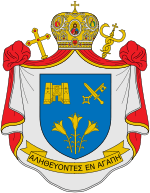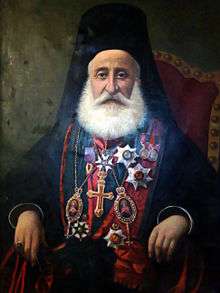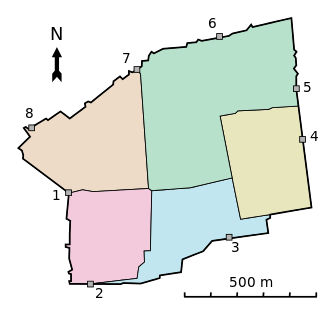Melkite Catholic Patriarchate of Antioch
The Melkite Catholic Patriarchate of Antioch is the only actual residential Patriarchate of the Melkite Greek Catholic Church (Eastern Catholic, Byzantine Rite). It was formed in 1724 when a portion of the Orthodox Church of Antioch went into communion with Rome, becoming an Eastern Catholic Church, while the rest of the ancient Patriarchate continues in full communion with the rest of the Eastern Orthodox Church.
| Catholic | |
|---|---|
.png) Patriarch Youssef Absi | |
 Coat of arms | |
| Incumbent: Youssef Absi elected June 21, 2017 | |
| Location | |
| Headquarters | Dormition, Damascus, Syria |
| Information | |
| First holder | Cyril VI Tanas |
| Denomination | Eastern Catholic |
| Established | 1724 (Current Form) |
| Cathedral | Cathedral of Our Lady of the Dormition |
| Bishops emeritus | Gregory III Laham |
| Website | |
| www.melkitepat.org | |
| Part of a series on |
| Particular churches sui iuris of the Catholic Church |
|---|
Latin cross and Byzantine Patriarchal cross |
| Particular churches are grouped by rite. |
| Alexandrian Rite |
| Armenian Rite |
| Byzantine Rite |
| East Syriac Rite |
| Latin liturgical rites |
| West Syriac Rite |
|
|
The Melkite Greek Catholic Patriarch of Antioch's present complete title is Patriarch of Antioch and of All the East, of Alexandria and of Jerusalem of the Melkite Greek Catholic Church, incorporating both of the church's other titular patriarchates.[1]
Its archiepiscopal see is the Cathedral of the Dormition of Our Lady (Arabic: كاتدرائية سيدة النياح للروم الملكيين في دمشق ) in Damascus, Syria. It was visited by Pope John Paul II in 2001.
The Melkite Greek Catholic Church is one of five churches that are continuations of the original See of Antioch. Thus, the Melkite Greek Catholic Church traces its existence all the way back to Saint Peter in a line of apostolic succession acknowledged by both Catholic and Orthodox canons. This claim is accepted by the Holy See and is not disputed by the other two Eastern Catholic Churches that also claim descent from the ancient See of Antioch, namely the Maronite Church[2] and the Syriac Catholic Church,[3] which both also have Patriarchs of Antioch.
Proper province and archdiocese
The Patriarch also holds the office of Metropolitan of an empty Ecclesiastical province without an actual suffragan see, actually comprising only his proper Metropolitan Archeparchy of Damascus (of the Melkites)/ Damasco (Curiate Italian) / Dimašq / Aš-Šām / Damascen(us) Græcorum Melkitarum (Latin). Like the Patriarchate, in Rome it depends only upon the Congregation for the Oriental Churches.
As per 2014, it pastorally served 3,000 Catholics in 8 parishes and 1 mission with 9 priests (6 diocesan, 3 religious), 3 deacons, 33 lay religious (3 brothers, 30 sisters) and 10 seminarians.
Titular Patriarchates of Alexandria and of Jerusalem
In continuation of the earlier Melkite patriarchates of those ancient sees, two titular patriarchates exist, which are however simply titles, vested in the residential Patriarch of Antioch, which also have Catholic residential counterparts:
- Melkite Catholic Titular Patriarch of Alexandria
- Melkite Catholic Titular Patriarch of Jerusalem
Melkite Greek Catholic Patriarchs of Antioch, Alexandria and Jerusalem
During a vacancy in the Patriarchate (such as following the resignation of Gregory III Laham in 2017), the bishop of the permanent synod who is most senior by ordination serves as administrator in chief of the Melkite Greek Catholic Church.
- Cyril VI Tanas (born Syria) (1724.10.01 – death 1759.07.08)
- Athanasius IV Jawhar ([Jaouhar]) (born Syria) first term (1759.07.19 – 1760.08.01), next Eparch (Bishop) of Saida of the Greek-Melkites (Lebanon) (1761 – 1788.05.05 see below)
- Maximos II Hakim (born Syria), Basilian Chouerite Order of Saint John the Baptist (B.C.) (1760.08.01 – death 1761.11.15); previously Archeparch (Archbishop) of Aleppo of the Greek-Melkites (Syria) (1732 – 1760.08.01)
- Theodosius V Dahan (born Syria), B.C. (1761.12.24 – death 1788.04.10), previously Metropolitan Archeparch (Archbishop) of Beirut of the Greek-Melkites (Lebanon) (1736 – 1761.12.24)
- Athanasius IV Jawhar second term (see above 1788.05.05 – death 1794.12.02)
- Cyril VII Siaj (born Syria) (1794.12.11 – death 1796.08.06), previously Metropolitan Archbishop of Bosra of the Greek-Melkites (Syria) (1763 – 1794.12.11)
- Agapius II Matar (born Syria), B.S. (1796.09.11 – 1812.02.02), previously Superior General of Basilian Order of the Most Holy Saviour (B.S., Salvatorian Fathers) (1789 – 1795), Eparch (Bishop) of Saïdā of the Greek-Melkites (Lebanon) (1795 – 1796.09.11)
- Ignatius IV Sarrouf (born Syria) (1812)
- Athanasius V Matar (born Syria) (1813)
- Macarius IV Tawil (born Syria) (1813–1815)
- Ignatius V Qattan (born Syria) (1816–1833)
- Maximos III Mazloum (born Syria) (1833–1855)
- Clement Bahouth (born Egypt) (1856–1864)
- Gregory II Youssef-Sayur (born Egypt) (1864–1897)
- Peter IV Jaraijiry (born Lebanon) (1898–1902)
- Cyril VIII Geha (born Syria) (1902–1916)
- vacant (1916–1919)
- Demetrius I Qadi (born Syria) (March 29, 1919 – October 25, 1925)
- Cyril IX Moghabghab (born Lebanon) (December 8, 1925 – September 8, 1947)
- Maximos IV Sayegh (born Syria) (October 30, 1947 – November 5, 1967)
- Maximos V Hakim (born Egypt) (November 22, 1967 – November 22, 2000)
- Jean Assaad Haddad as Apostolic Administrator (June 6, 2000 – November 29, 2000)
- Gregory III Laham (born Syria) (November 29, 2000 – May 6, 2017)
- Jean-Clément Jeanbart as Administrator (May 6, 2017 – June 21, 2017)
- Youssef I Absi (born Syria) (June 21, 2017 – present)
Auxiliary Episcopate of the See of Antioch
- Auxiliary Bishop: François Abou Mokh, B.S. (1996 – 1998.07.27)
- Auxiliary Bishop: Isidore Battikha, B.A. (66) (1992.08.25 – 2006.02.09)
- Auxiliary Bishop: Jean Mansour, M.S.P. (1980.08.19 – 1997)
- Auxiliary Bishop: François Abou Mokh, B.S. (1978.02.07 – 1992)
- Auxiliary Bishop: Élias Nijmé, B.A. (1971.08.16 – 1978.02.07)
- Auxiliary Bishop: Saba Youakim, B.S. (1968.09.09 – 1970.10.15)
- Auxiliary Bishop: Nicolas Hajj (1965.07.30 – 1984.11.03)
- Auxiliary Bishop: Néophytos Edelby, Basilian Aleppian Order (B.A.) (1961.12.24 – 1968.03.06)
- Auxiliary Bishop: Pierre Kamel Medawar, Society of Missionaries of Saint Paul (M.S.P.) (1943.03.13 – 1969)
Gallery
 Gregory II Youssef
Gregory II Youssef Peter IV Jeraigiry
Peter IV Jeraigiry Cyril VIII Geha
Cyril VIII Geha- Gregory III Laham
- Youssef Absi
See also
- List of Catholic dioceses in Syria
- Latin Patriarchate of Antioch
- List of Popes
References
Sources and external links
- List of the Melkite Patriarchs of Antioch from Melkite Church official website
- GCatholic.org - Greek-Melkite Catholic Patriarchate of Antioch
- GCatholic - Patriarchal proper Metropolitan Archeparchy of Damascus
- History of Melkite Church including Cannons regarding Reunion with Rome and the legal continuation of the See of Antioch.
- Legal circumstances of union with Rome.
- Catholic Hierarchy entry

